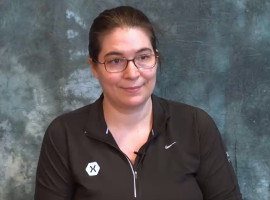InfoQ Homepage Infrastructure Content on InfoQ
-
Yao Yue on Making Twitter's Pelikan Cache Fast And Reliable
Yao Yue explains the motivation for building Twitter's Pelikan cache, how Pelikan differs from other caches, what to do and what to avoid when building reliably low latency software, and much more.

-
Peter Bourgon Discusses Coding in Idiomatic Go, Building Microservices with Go-kit, and Weave Net
InfoQ sat down with Peter Bourgon, engineer at Weaveworks, and discussed how to program in idiomatic Golang, building microservices with his Go kit framework, and how Weave Net and Weave Mesh work.

-
Anne Currie Discusses Microscaling, Following in the Footsteps of Google, and the Future of Containers
InfoQ sat down with Anne Currie, co-foudner at Microscaling Systems, and discussed how container technology is currently impacting the IT industry. Topics covered included VMs vs containers, following in the footsteps of Google, and real-time scaling.

-
Interview with Simon Ritter on Java 9
Alex Blewitt talks to Simon Ritter at QCon London 2016 about Java 9, the impact that Jigsaw will have on developers, and Java on the Raspberry Pi along with the differences between the Azul JVMs and Open JDK.

-
Rachel Reese on The Good and Bad of Microservices (with F#)
Rachel Reese on the challenges and benefits of using microservices at Jet. In particular how F# made it easier to refactor and maintain hundreds of microservices. The hard bit is the infrastructure.

-
Interview with Martin Thompson on High Performance Java
Alex Blewitt speaks to Martin Thompson at QCon London 2016 on his open-source high-performance networking stack Aeron, and how it avoids garbage collection delays for consistently low latency. Martin explains the use of the xadd processor instruction to avoid spinning wait loops and looks ahead to where CPU technology is heading in the future.

-
Peter Alvaro on Distributed Programming, CRDTs, LDFI
Peter Alvaro discusses some of the reasons that distributed programming is hard, Lineage-driven Fault Injection, static analysis to check deterministic behaviour, CRDTs, and much more.

-
David Riddoch on Bypassing the Kernel and Hypervisor for Network I/O, Solarflare, OpenOnload
David Riddoch explains how bypassing the OS kernel's networking stack can improve latency and throughput, networking with Solarflare and OpenOnload, hypervisor bypass, and much more.

-
Interview with Gil Tene on Hardware Transactional Memory
Gil Tene speaks to Alex Blewitt at QCon London 2016 on the upcoming support for hardware transactional memory in server-class Intel chips, and what it will mean for the JVM. Tene discusses what kinds of applications will benefit from speculative lock elision and increasing concurrency in the near future on multi-core server platforms.

-
Amir Chaudhry on Unikernels, MirageOS, HalVM, Rump Kernels
Amir Chaudhry explains the ideas behind Unikernels, implementations like the OCaml-based MirageOS and Haskell-based HalVM, Rump Kernels for integrating with legacy code and much more.

-
Adam Wick on Security, Formal Methods, Types, Unikernels, HaLVM, DRM
Adam Wick talks about software security, research into formal methods and randomisation as well as documentation and types to help write secure software, HalVM and other Unikernels, DRM.

-
Mik Kersten on Current and Future ALM Trends
Mik Kersten talks about current and future trends in ALM and the support for approaches like large scale Agile, DevOps, Docker, Big Data, functional languages and the Internet of Things.
